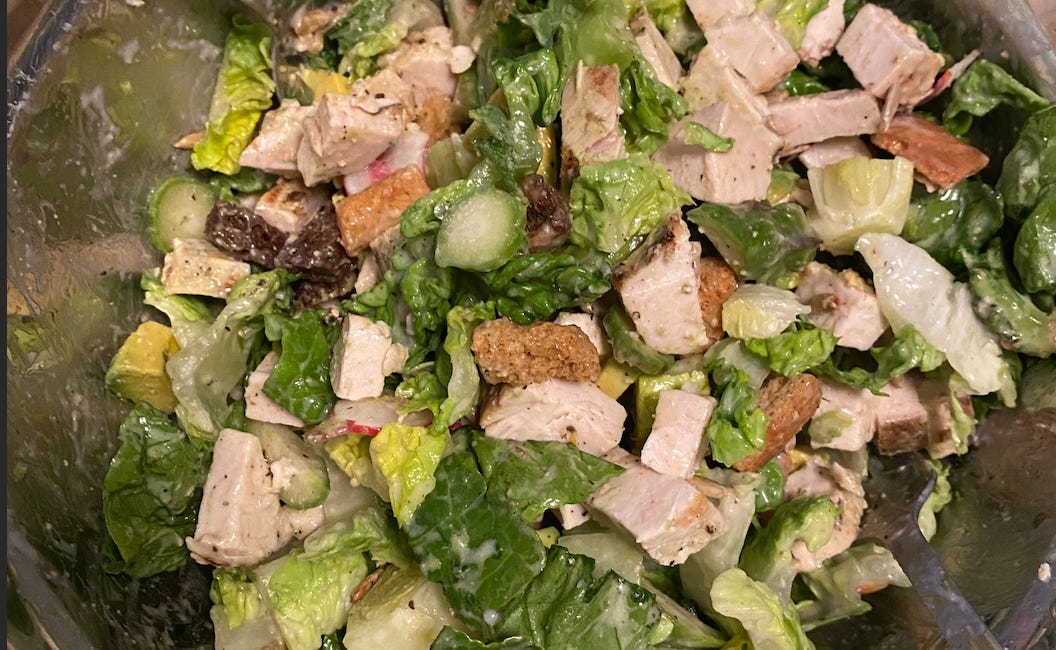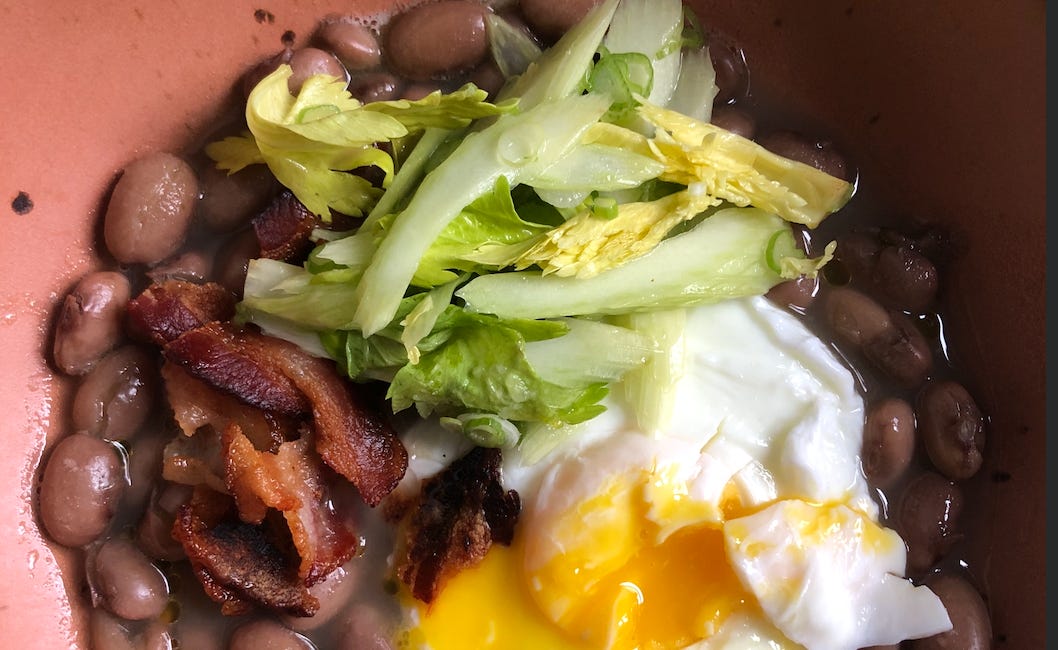On breaking up with perfectionist cooking
Embracing newer, softer standards for feeding myself
Hi all,
I took a break from the newsletter last week because 1) I was working overtime to submit a big first chunk of my cookbook(!) and 2) I had 48 hours of food poisoning (the fever and fatigue kind, not the barf and diarrhea kind—somehow can’t decide which is worse). I apologize for the interruption in the #content, but I am back now.
Being deep in book mode has forced me to crystallize a lot of the core beliefs I’m trying to convey within its pages. Recently, I’ve been thinking about the idea of good days and bad days as they pertain to one’s mental health and life in the kitchen. I wrote this down in my notebook recently:
“On your good days, you want to set yourself up for the bad days—having a stocked pantry makes it possible to whip up something that still makes you feel good when you’re feeling down, because depression is not linear.”
Many people talk about the joys of cooking on the good days. It’s an idea that’s easy to love: We celebrate a birthday by baking a cake; we gather with friends and family around a holiday roast. We toast a friend’s promotion with a fancy charcuterie board. But fewer people talk about cooking on the bad days—specifically why it’s worth cooking at all when you’re having trouble finding the will to get dressed in the morning. And this is the question I’ve been trying to answer for myself lately.
Throughout my twenties and early thirties, I often used to weather the bad days by taking cooking out of the equation entirely and ordering takeout, which was an expensive and ultimately unsatisfying habit that didn’t leave me feeling good. I didn’t realize back then how much an “all or nothing” mentality ruled my thinking both in and out of the kitchen. I spent many of those years working in the world of glossy food media, during which time I was indoctrinated into a narrow, quite demanding style of cooking that I believed for a long time was the only “worthwhile” way to cook. It wasn’t really Parm unless you sourced it by the block (and it had to be Reggiano, mind you) and grated it yourself. It wasn’t really “proper pasta” unless you were emulsifying it with carefully calibrated quantities of salted pasta water, butter, and cheese. If you weren’t cooking your beans from dried, what was even the point of eating beans? These, I’m not proud to say, were real thoughts from which I derived some deranged sense of moral superiority during my years as a food magazine editor.
Cooking became another way to perform perfectionism, another avenue via which I could prove myself. In this model, there was no room in the kitchen for a less-than-perfect version of me. On the days I couldn’t fathom unwrapping and then *rewrapping* a block of Parm and grating it to then emulsify it into a perfect little pasta, I often wouldn’t even try. If I couldn’t make a meal that was worth sharing on Instagram, it wasn’t a meal worth making. And out came the takeout app, because you can’t opt out of feeding yourself just because you’re feeling low. (And to state as much is to acknowledge the enormous privileges of having choice and access to food at all, not to mention the financial means to opt for takeout when you don’t feel like cooking.)
I wish I had given myself more ways to achieve small, accessible wins in the kitchen during those low periods. I wish I had been able to meet myself where I was, rather than pretend I was mentally and emotionally somewhere I wasn’t. Clicking the “Order Now” button in a takeout app was a solution, but it wasn’t a win. The real win came years later, when I started to break free of the mindset that only a certain type of cooking is worthy or worthwhile, and if I wasn’t able to meet that standard at any given time, it must mean *I* was not worthy or worthwhile.
The process of letting go of such deeply engrained judgment has been liberating, and has allowed me to start embracing a much softer approach to cooking on the bad days. Over time, I have started to shift my thinking from, “Why am I feeling this way? Why can’t I do this?” to, “I’m not okay. What is the choice I want to make in the kitchen that will best support me right now?” I’ve identified reasons why I find it worthwhile to strive to cook on the bad days: I cook because it is the best way I know to practice the art of meeting myself where I’m at. In almost every other arena of my life, it’s easy for me to ignore internal cues and signals to take pause, to say no to a plan, to turn down an assignment when I’m already overloaded. Cooking has become my best clue into my internal state, a barometer for how I should be treating myself right now based on what I feel capable of accomplishing.
From there, I can start to make decisions that make more sense for where I’m at. If I’m feeling 40%, I know I should try to pick something to cook that takes 40% effort. If haven’t showered in three days, trying my hand at a croquembouche is probably not going to be the thing that makes me feel better and in fact will probably send me into a tailspin when I inevitably burn the spun sugar. But maybe I could fry two eggs and plop them on a scoop of yogurt with salt and chili crisp. Maybe I could toast a pita from the freezer to go with it, or slice a mini cucumber to pile on top of the yogurt. Obviously my 40% looks different from your 40%, but the point is that, during times when the normal things already feel hard, it feels so good to accomplish something and have that win for yourself. Did I do this one good thing for myself? When I’m able to answer this questions, it becomes infinitely easier to ride out my low spells.
The hardest part of shifting your mentality is accepting that there probably *will* always be some bad days—because depression is not linear, as mentioned at the beginning of this essay—and you can’t know or control when they’ll arrive at your door. But once you accept that the point isn’t to ensure they never come back and start considering what a life inclusive and supportive of those days looks like, maybe you too will find yourself ready to let go of unrealistic expectations around food and what it should and shouldn’t be.
This has always been a newsletter about caring for yourself through food, among other things. It is so much easier to care for yourself on the good days; on the bad days, it’s easy to let it all slip. But true care starts when we admit that we’ve been asking too much of ourselves for too long. For me, it starts in the kitchen. Where does breaking free of perfectionism start for you?








My dietician today told me in our appointment today that the people most successful in creating a nourishing and balanced relationship with food are "B" students. That is to say that the all-or-nothing mindset can be so harmful when it comes to feeding ourselves.
I feel so grateful for this substack and feel so seen and affirmed in this space.
I cried reading this. I can’t really explain, but so much of my stuff…